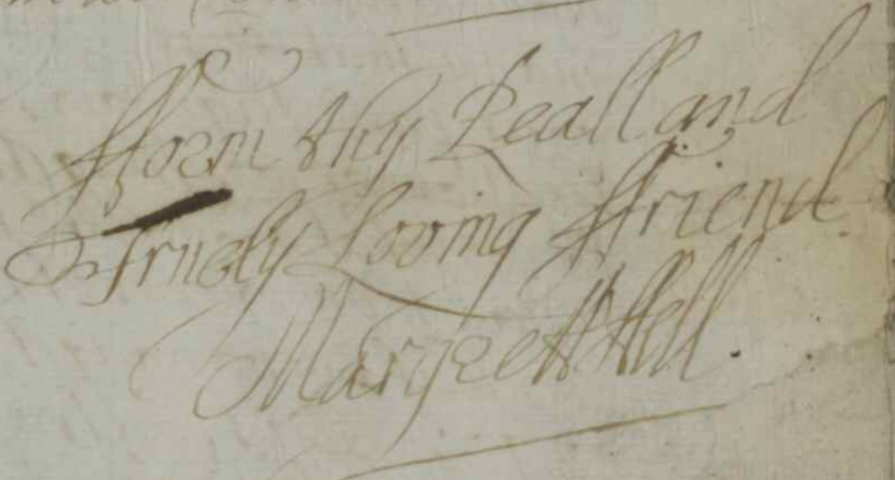
Detail showing the signature of Margaret Fell, from a letter of 20 January 1660 (UK National Archives, Kew, SP 29/91 f.9; source of image courtesy of Gale Cengage, Stuart State Papers Online)
People willing and able to act as linchpins frequently prove themselves indispensable, not least in moments of crisis as individuals scatter and communication between the disparate and moving parts of a group becomes ever more complicated. The early Quaker Margaret Fell (1614–1702), some of whose correspondence has been collated and added to EMLO to create a ‘starter catalogue‘, emerged in the late-seventeenth century as one such crucial figure. Referred to frequently today as ‘the Mother of Quakerism’, this Lancashire-born woman established and maintained over decades a complex epistolary network that united members of the Quaker community across Europe and North America. Margaret Fell acted as the constant. Diligently she exchanged letters with the itinerant faithful during their extensive travels and relayed relevant, up-to-date information regarding the travels and travails of members of the movement, as well as providing all available details of the imprisonments and trials that preachers in the early Quaker church were forced to endure.
Thanks to today’s network of scholars working on women’s early modern letters both with and through Women’s Early Modern Letters Online [WEMLO], Marjon Ames contributed metadata describing a considerable number of Fell’s letter, each of which she had worked with during the preparation of her 2016 publication Margaret Fell, Letters, and the Making of Quakerism.[1. Marjon Ames, Margaret Fell, Letters, and the Making of Quakerism (Routledge [Taylor & Francis], 2016).] To the listing of these letters was added a further cluster of record describing Fell’s correspondence that survives in the Stuart State Papers at The National Archives at Kew, which has been a focus of attention during the recent Networking Archives project. Together, these letters form the beginnings of a significant catalogue for Fell and her fellow Quakers in EMLO and WEMLO, with each record including a text that summarizes the content in detail.
The past three years have been far from ‘run of the mill’ at EMLO as externally funded research under the aegis of the AHRC Networking Archives project has been conducted alongside EMLO’s more habitual workflows of collating, combining, and publishing descriptions of early modern scholarly correspondence. As EMLO switches this year into a fresh phase of work, momentum is building once again and users should expect to benefit from more frequent publication of new catalogues, together with the provision of increasing numbers of links directing them to both manuscript images and accessible texts hosted on a wide range of partner databases. We hope very much in addition that this body of early Quaker correspondence will increase during the coming year and extend from these foundation letters of Margaret Fell and her circle. Should anyone reading this post be interested in collating metadata for, or preparing texts of, early Quaker correspondence, we at EMLO should be delighted to strike up a conversation.
